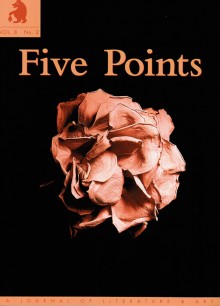Five Points, Vol. 8 No. 2
Spring 2004From Hayden Carruth, “I preferred independence, and I emphasized that in my poetry, in my prose too, I think, and in my life.”
Sample Content
Lucyna Prostko
Landscape After the War
The earth opened its mouth like a snake—
the song of locust poured toward the sea.
We must be silent, there are things one doesn’t
tell in a village mined with passion, scorched to fear.
His mouth doesn’t tremble when he shows us
the numb “trunkless legs” of buildings, sometimes
only the pathway of a foundation, stone
glazed by the smoke, the lake of ash where
olive groves covered the hill. “The artillery
was heavy,” he says looking toward the Vielebit
Mountain, away from the site. The moon glides
against the sun, whose red disheveled head
slips behind us. I think of women in black,
slicing watermelons at dinnertime, pouring wine
the scent of a pomegranate; of women, kneeling
in an old church where frescoes weep into the stone;
women who sway back and forth, back and forth,
dry rosary strings cling to their veins.
I could’ve been one of them, and even you
could turn if you were here. Even you, who I swear
I know better than myself, could talk harshly, send me
for pitchers of wine, as if they could transfuse
blood back into veins. I look at you,
as if you were made of glass—I see one self who dies,
on the hot skin of the mountain, his skull opens into the earth, a secret
spring eyes wide to nothingness.
I see a self who kills, perhaps even his best friend
over a game of cards, because he cheated and your
hand is quicker. And maybe there is even a self—
the unmentionable one—who bruises one woman’s arm,
slides between her legs because she speaks a different
language, because the men of her tribe killed your daughter,
because her god and your god are numb and deaf as a church before sunrise.
I don’t want to think about the possibility of evil,
the opportunity to drink the blackened song of death,
to die in one’s sleep, a hundred years old, a shriveled
statue to life, away from the heat of time; somewhere
perfect, California, somewhere at the edge
of another sea.
The earth opened its mouth like a snake.
The war makes a man. We sing and drink, our host
shows us his house; the fisherman’s net spread
against the wall, starfish and seahorses caught
in its folds, dry and still; on the other wall,
I notice a wooden cross the size of a door.
In the photos he shares with us
he embraces a general and a priest, “This was a war
where simple men became generals.” The earth
had spoken. He answered its call. He had died
in winter, and then returned in two weeks,
miraculous as Jesus with a metal plate in his head.
Who understands the language of the earth? Even the swallow
who weaved his nest in the hole ripped by the tank,
flies in circles around our table and the dusk falls
happily, as a blindfold.

